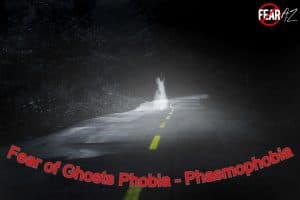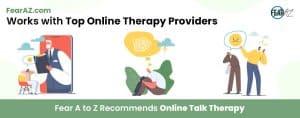Share This Article
Phasmophobia, or the Fear of Ghosts: More than Scary
Do you ever sense a presence around you when you’re alone? Is your fear reinforced when you hear an unexplained noise?
Do you always sleep with the lights on? Are you afraid of visiting cemeteries or places where you know people have died?
Do you have nightmares after hearing a ghost story? Are you scared of going to the bathroom at night because of your fear?
If so, then you may be suffering from phasmophobia.
An individual who is scared of ghosts, or even demons, can experience intense bouts of stress and anxiety merely thinking about them. All types of ghosts can trigger this reaction, including phantoms, ghouls, and spirits.
You probably don’t understand what’s happening to you. It’s difficult explaining your fear to people because many don’t believe ghosts are real. However, your terror is quite real. When you think about ghosts, you grow so pale you begin to resemble a ghost yourself.
Let’s take a look at the causes, symptoms, and methods of overcoming this phobia.

Phasmophobia Meaning
Phasmophobia is an all-consuming fear of ghosts. Those who suffer from this phobia often feel a strong presence around them when they’re alone. This can quickly turn into a feeling of dread so severe one can barely function.
Is Phasmophobia Scary?
For those suffering from this phobia, it most definitely is scary. You can’t fake that bone-chilling terror. People who have phasmophobia often feel these sensations are life-threatening.
As a result, day-to-day activities become challenging. Even going to the bathroom in the middle of the night seems like an impossible task.
What Is Phasmophobia Based On?
Phasmophobia is closely related to the fear of the dark. Other phobias also contribute to phasmophobia, including the fear of being alone, or isolophobia. Research suggests that people who are afraid of being alone, especially at night, are likely to suffer from phasmophobia. Many often go through sleepless nights because of their fear of ghosts.
What Are the Causes of Phasmophobia?
It’s unclear if people develop a fear of ghosts first, or if it develops because an individual fears the dark or being alone. However, children may develop a fear of ghosts first if they’re exposed to situations which traumatize them.
Exposure in Childhood
For example, a child may develop phasmophobia if they watch a scary movie. Scenes from horror films can have lasting effects. Others develop this irrational fear after listening to ghost stories told by older family members. In some cultures, ghosts are used as a threat when children misbehave.
Biological Factors
Some people are genetically predisposed to extreme bouts of anxiety. They are at a higher risk of developing phobias.
Supernatural Beliefs
A lot of religions accept that supernatural forces exist—demons, spirits, or other entities. Some religions also teach that these invisible entities are evil and capable of causing harm to human beings. Such notions can induce a fear of ghosts.
Parapsychology
This subcategory of science tracks any form of paranormal activity. Some of the results obtained can’t be explained under the laws of science. Because of this, people who follow parapsychology may slowly begin to fear ghosts. Results obtained from parapsychology can often scar the mind and induce this phobia.
Symptoms of Phasmophobia
Here is a list of some of the most common symptoms of the fear of ghosts.
Mental/Emotional Symptoms
- Feelings of helplessness
- Feeling that you’re being watched by some entity
- Fear of death
- Unable to function in daily life
- Obsessive and irrational thoughts about ghosts
Physical Symptoms
- Panic attacks
- Migraines
- Accelerated heartbeat
- Profuse sweating
- Feeling drowsy in the day (due to lack of sleep)
- Inability to go to the bathroom at night
- Refusing to be alone
- Can’t sleep alone
- Difficulty breathing
- Tight feeling in the chest
- Nausea or vomiting
- Feeling dizzy or squeamish
How to Overcome Phasmophobia
There are various professional and self-help methods to deal with your fear of ghosts. But don’t expect to see results overnight. It will take time before you can fully cope with this condition.
Self-Help Methods for Fear of Ghosts Phobia
If you’d rather tackle your excessive fear of ghosts on your own, there are several methods you can try. Each method is unique, but works to improve your coping skills to help you better manage your fear. Below are just four examples of the many techniques available.
Educate Yourself
The first step in the self-help process is to understand that you have a fear and that it’s hampering your day-to-day activities. Once you’ve done that, you can learn all you need about your phobia from reputable websites or books. This information will enable you to create a structured plan for dealing with your fear.
Surround Yourself with Those You Trust
Having a strong support system plays a huge role in dealing with any kind of fear. Those who have overcome their fears agree that no one should walk this path alone. You need to interact with people who love and support you no matter what. They will motivate you to do better, even when you have rough days. This encouragement will boost your morale and encourage you to keep working on your fears.
However, you may not be comfortable with talking to someone. That’s all right. Try joining discussion groups on phobias. Discussion groups can help you overcome your fears and show you that you’re not the only one who’s fighting demons.
Keep Exercising
If there’s one thing you shouldn’t stop doing during this period, it’s exercising. Physical activity is known to release stress and calm the mind. Exercise releases endorphins, more commonly known as the “happy hormones.”
Prioritize cardiovascular training. The best part about cardio is that you don’t need any expensive equipment. All you need is an open space, and you’re good to go. Cycling, running, swimming, and jumping rope are just some exercises you can try.
Express Yourself
People suffering from phobias often tend to have bouts of stress and overthinking.
The easiest way to curb this behavior is by expressing yourself. You don’t necessarily have to talk to someone. You can write down your feelings in a notebook, on your phone, or computer. This allows you to rid your mind of any negative and unwanted thoughts.
Seeking Professional Help
Sometimes, self-help methods may have little impact on your fears. That’s nothing to be ashamed of. Simply consult a trained professional for phasmophobia treatment. With professional therapy, you’ll probably encounter one of the following interventions.
Mindfulness Therapy
Mindfulness-based stress therapy or MBSR is a form of therapy used with those who suffer from severe stress, depression, anxiety, ADHD, and low self-confidence. A therapist works with you to eliminate distractions caused by your surroundings and helps you focus on your thoughts in the moment.
Cognitive Behavioral Therapy
This is a method of therapy which works to alter your state of mind to bring it to the desired goal. CBT is a highly effective method and can have long-lasting effects. However, it doesn’t resolve past traumas. Rather, it deals with situations in the present.
Exposure Therapy
This is a gradual form of therapy. Here, you learn to confront your fears directly in a safe environment. At first, a therapist may ask you to merely think about ghosts. Gradually, you’ll be exposed to more intensity such as viewing images of ghosts or watching videos or films involving ghosts until you rid yourself of the fear.
How to Avoid Phasmophobia
The first step to avoid this phobia is to identify what’s causing it. Try to accept your situation in order to progress. Stay patient and work slowly to achieve your goal. Exercising, meditation, and expressing yourself are some methods that can work wonders. Only take medication as a last resort and under the supervision of a medical professional.
In Conclusion
It may feel like you’ll never get over this irrational fear. But with a little work, you’ll gradually begin to live life the way you want to. Have faith in the process and yourself. Soon, the only thing the dark will remind you of is a good night’s sleep.




